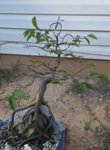clevetromba
Shohin
I glanced at my hornbeam the other day and thought the topmost branch had a dead twig on it.
!
A closer look revealed a greyish brown praying mantis. I've never seen them this color before, I've only seen green ones. I'm happy to have him perusing my collection, since they eat other insects. By the way, back in early July my hornbeam leaves started turning brown so I cut them all off, hoping it would grow a new batch of smaller leaves. It took until early to mid August to grow more leaves, and some branches just didn't leaf out. Also, the new leaves came in full size. Has anyone else had luck with reducing leaf size in American hornbeam?

!

A closer look revealed a greyish brown praying mantis. I've never seen them this color before, I've only seen green ones. I'm happy to have him perusing my collection, since they eat other insects. By the way, back in early July my hornbeam leaves started turning brown so I cut them all off, hoping it would grow a new batch of smaller leaves. It took until early to mid August to grow more leaves, and some branches just didn't leaf out. Also, the new leaves came in full size. Has anyone else had luck with reducing leaf size in American hornbeam?

